Accelerate > Publications
Search this online library featuring the latest FAO publications, issue papers and briefs which offer up-to-date knowledge and innovative insights for SDG acceleration.
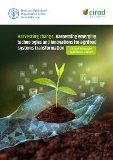
Harvesting change: Harnessing emerging technologies and innovations for agrifood system transformation - Global foresight synthesis report
2023
This study assesses a selection of technologies and innovations, which potentially could be of paramount importance in addressing agrifood challenges until 2050, as well as the most important trends and drivers that will influence the emergence of agrifood technologies and innovations and their triggers of change, including some regional aspects.
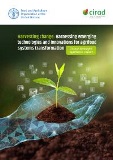
Harvesting change: Harnessing emerging technologies and innovations for agrifood system transformation
2023
The study assesses a selection of technologies and innovations, which potentially could be of paramount importance in addressing agrifood challenges until 2050, as well as the most important trends and drivers that will influence the emergence of agrifood technologies and innovations and their triggers of change, including some regional aspects. The goal is also to build plausible future scenarios for the evolvement of the emerging technologies and innovations in the future with the time...
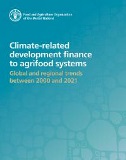
Climate-related development finance to agrifood systems: Global and regional trends between 2000 and 2021
2023
This publication addresses the persistent knowledge gap related to climate finance to agrifood systems, providing data and information to support countries making informed decisions towards agrifood systems transformation. The analysis brings to light the evolution of climate finance in agrifood systems over the past two decades, showcasing unique sectorial analysis of climate finance allocations for adaptation and mitigation, delving into the diversity of actors involved...
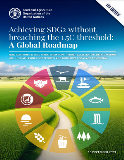
Achieving SDG2 without breaching the 1.5C threshold: A Global Roadmap
2023
Accelerated climate actions can transform agrifood systems and help achieve food security and nutrition both today and tomorrow.
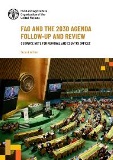
FAO and the 2030 Agenda Follow-up and Review: Guidance Note for Regional and Country Offices
2023
The Guidance Note describes the process of the preparation of the VNRs and what FAO Regional and Country Offices need to be aware and mindful of when providing support to the national partners. It covers information about the importance of the follow-up and review process for the 2030 Agenda and the SDGs, including information about the gaps in the coverage of the Voluntary National Reviews, and recommendations on strengthening VNRs to be meaningful instruments for the acceleration of the SDGs.
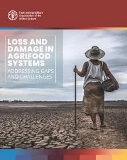
Loss and damage and agrifood systems - Addressing gaps and challenges
2023
The purpose of this report is to stimulate discussions on the central role of agrifood systems in the loss and damage debate and identify the gaps in data, knowledge and finance that need to be addressed. The report provides an overview of the loss and damage concept, the status of analytical methodologies and tools, a summary of the reporting on loss and damage in nationally determined contributions (NDCs), an outline of the policy needs and some preliminary analysis of the financing needs.
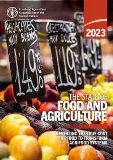
The State of Food and Agriculture 2023 - Revealing the true cost of food to transform agrifood systems
2023
The State of Food and Agriculture 2023 looks into the true cost of food for sustainable agrifood systems. The report introduces the concept of hidden environmental, health and social costs and benefits of agrifood systems and proposes an approach – true cost accounting (TCA) – to assess them.
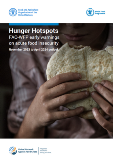
Hunger Hotspots: FAO-WFP early warnings on acute food insecurity, November 2023 to April 2024 outlook
2023
The Hunger Hotspots report by WFP and FAO identifies 18 hunger “hotspots” in a total of 22 countries where food security is expected to significantly deteriorate, and the outlook for the next six months from November 2023 to April 2024.
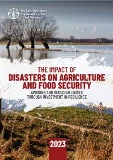
The Impact of Disasters on Agriculture and Food Security 2023 - Avoiding and reducing losses through investment in resilience
2023
The FAO flagship report on ‘The Impact of Disasters on Agriculture and Food Security’ provides a timely and comprehensive overview of how disasters are affecting agriculture and food security around the world. The report provides examples of actions and strategies for investing in resilience and proactively addressing risks in agriculture. It demonstrates ways to mainstream disaster risk into agricultural practices and policies..
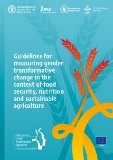
Guidelines for measuring gender transformative change in the context of food security, nutrition and sustainable agriculture
2023
These Guidelines include step-by-step guidance to formulate qualitative and quantitative indicators of gender transformative change to help gender experts and food security, agriculture and nutrition programme specialists in their efforts to design, implement, monitor and evaluate gender transformative interventions. These indicators should be distinctive from and a complement to other reach, benefit and empower indicators intended to contribute to gender equality outcomes in food security,...
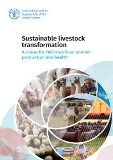
Sustainable livestock transformation. A vision for FAO’s work on animal production and health
2023
Within the framework of the United Nations 2030 Agenda for Sustainable Development, FAO assists Member Nations to improve sound policies, increase investments and develop good practices in the livestock sector.
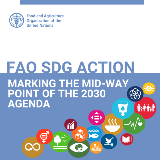
FAO SDG Action: Marking the mid-way point of the 2030 Agenda
2023
As we stand at the midpoint of the 2030 Agenda, it is both a moment of reflection and an opportunity to renew our commitment to achieving the SDGs. In August 2023, the FAO Office of SDGs launched a survey, receiving over 600 responses that shared valuable insights, experiences and actions taken by FAO offices towards the achievement of the SDGs. In addition this survey, FAO project data was leveraged to present this visual representation of FAO’s contribution to the 2030 Agenda implementation.
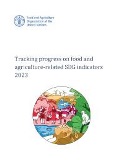
Tracking progress on food and agriculture-related SDG indicators 2023
2023
At the mid-point of the Agenda 2030 for Sustainable Development, there is an urgent need to understand where the world stands in eliminating hunger and food insecurity, as well as in ensuring sustainable agriculture. The new report of the Food and Agriculture Organization of the United Nations (FAO),offers analysis and trends on indicators across eight Sustainable Development Goals (SDGs) – in particular, SDGs 1, 2, 5, 6, 10, 12, 14 and 15.

The State of Food Security and Nutrition in the World 2023 - Urbanization, agrifood systems transformation and healthy diets across the rural–urban continuum
2023
This report provides an update on global progress towards the targets of ending hunger (SDG Target 2.1) and all forms of malnutrition (SDG Target 2.2) and estimates on the number of people who are unable to afford a healthy diet. Since its 2017 edition, this report has repeatedly highlighted that the intensification and interaction of conflict, climate extremes and economic slowdowns and downturns,...
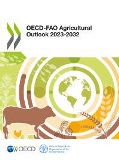
OECD-FAO Agricultural Outlook 2023-2032
2023
The Agricultural Outlook 2023-2032 is a collaborative effort of the Organisation for Economic Co-operation and Development (OECD) and the Food and Agriculture Organization of the United Nations (FAO). It brings together the commodity, policy and country expertise of both organisations as well as input from collaborating member countries to provide an annual assessment of the prospects for the coming decade of national, regional and global agricultural commodity markets.
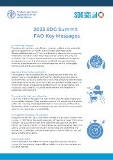
2023 SDG Summit: FAO Key Messages
2023
The 2023 SDG Summit will serve as a pivotal event towards achieving the SDGs, as gathered Heads of State and Government are to carry out a comprehensive review of progress, respond to the impact of multiple crises, and provide high-level political guidance on transformative and accelerated actions for achieving the 2030 Agenda. FAO has developed these key messages to inform the discussions in the lead up to and during this Summit and the Political Declaration which will result from them.
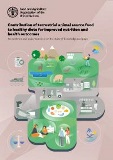
Contribution of terrestrial animal source food to healthy diets for improved nutrition and health outcomes - An evidence and policy overview on the state of knowledge and gaps
2023
FAO’s Committee on Agriculture requested a comprehensive, science- and evidence-based global assessment of the contribution of livestock to food security, sustainable food systems, nutrition and healthy diets, considering environmental, economic and social sustainability. The assessment consists of four component documents. This first component document provides a holistic analysis of the contribution of terrestrial animal source food to healthy diets for....
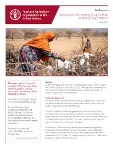
Importance of investing in agriculture in emergency contexts
2023
With 222 million people experiencing high acute food insecurity across 53 countries, and an alarming food security outlook for 2023, investing in agriculture in emergency contexts has never been so critical. Agriculture assistance is life-saving. It is significantly less expensive to help rural families produce food, than to provide them food.
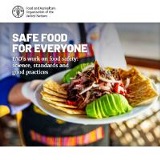
FAO's work on food safety: science, standards and good practices
2023
A life necessity, a social event, an act of love, a way of expressing ourselves: food is all of these things, as well as an important source of employment and the heartbeat of every economy. But the food chain – growing, harvesting, processing, packaging, transporting, distributing, trading, purchasing, preparing, consuming, and eventually disposing of what we consume – is a fragile sequence in which every point is fraught with risk....
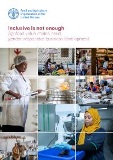
Inclusive is not enough – Agrifood value chains need gender-responsive business development
2023
This brief, jointly developed by the FAO Regional Office for Africa and the FAO Regional Office for the Near East and North Africa, aims to trigger a critical reflection on the concept of “inclusive” agribusiness and propose a new definition that highlights the importance of considering gender equality and women’s empowerment as an integral component of agribusiness development.
Browse by SDG
- SDG1: No Poverty
- SDG2: Zero Hunger
- SDG3: Good Health & Well-being
- SDG4: Quality Education
- SDG5: Gender Equality
- SDG6: Clean Water & Sanitation
- SDG7: Affordable and Clean Energy
- SDG8: Decent Work and Economic Growth
- SDG9: Industry, Innovation and Infrastructure
- SDG10: Reduced Inequalities
- SDG11: Sustainable Cities and Communities
- SDG12: Responsible Consumption and Production
- SDG13: Climate Action
- SDG14: Life Below Water
- SDG15: Life on Land
- SDG16: Peace, Justice and Strong Institutions
- SDG17: Partnerships for the Goals
Browse by Better
Browse by Priority Area
- Innovation for Sustainable Agriculture Production
- Blue Transformation
- One Health
- Small-Scale Producers' Equitable Access to Resources
- Digital Agriculture
- Healthy Diets for All
- Nutrition for the Most Vulnerable
- Safe Food for Everyone
- Reducing Food Loss and Waste
- Transparent Markets and Trade
- Climate Change Mitigating and Adapted Agrifood Systems
- Bioeconomy for Sustainable Food and Agriculture
- Biodiversity and Ecosystem Services for Food and Agriculture
- Achieving Sustainable Urban Food Systems
- Gender Equality and Rural Women's Empowerment
- Inclusive Rural Transformation
- Agriculture and Food Emergencies
- Resilient Agrifood Systems
- Hand-in-Hand Initiative
- Scaling up Investment
